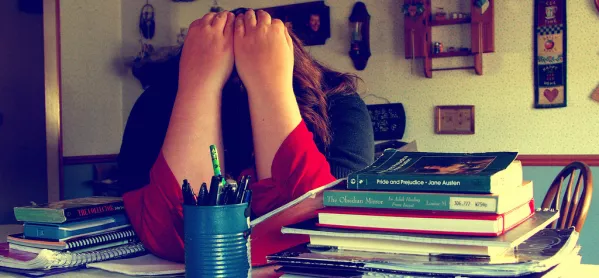I want to be a great teacher - for the kids, my colleagues, my school and myself - but I also want to be a person, too. I’m keeping my head above water in terms of workload for now, but I need mental space away from my job.
So you’re struggling to ‘switch off’?
Exactly. I’ll be 10 minutes into a TV show before I realise I haven’t watched any of it. I’ve been colour-coding seating plans or sending imaginary emails in my head.
Are you regularly bringing work home with you?
I was, yes, but I’ve made a conscious effort during the past few months to get work done after school and go home work-free - at least for a couple of nights each week. I’ve even stopped my phone from alerting me to those dreaded emails at 9pm on a Tuesday night.
Great! So your phone is silent, but what is the volume like inside your head?
It depends what’s happening in school. When things are plodding along as usual, the noise is bearable. It’s when you throw in extras - data capture deadlines, “aspirational” target grades, new reading initiatives, pupil progress reports, “Mocksted” - that I hear the noise increase. At times like this, my mind feels like a broken jukebox, blaring out the first few seconds of a track before jumping haphazardly to the next.
It sounds to me like you’re desperately in need of some mindfulness practice.
I’ve heard of it. I’m dubious. What is it exactly?
It’s about being more aware. Using your senses. Exploring everyday objects, places and situations, as if you’ve never seen them before. Consciously concentrating on what you are doing, basically, rather than being on autopilot.
Pay more attention to the present moment, you mean? I’ve actually been doing a little bit of this whenever I eat - I’m trying to curb my life-long habit of overeating. Along the way, I have noticed that it’s fascinating to look, taste, smell and feel your food, rather than hoovering it all up unconsciously. But how will not doing work make me less stressed about work?
Mindful eating is a great place to start, because you have to eat, no matter how much work you have. Concentrating on the food gives your brain a break from constantly circulating work problems. Ideally, you want to find a few activities like this, usually performed on autopilot, that you can execute mindfully.
Like my morning shower, maybe? When I make a cup of tea? My drive to school?
Whatever works for you, but you want to try and build this into your daily life. Even better if you can try four to eight minutes of mindful breathing before setting off to work.
I’m not sure that sitting and listening to my inhale and exhale is going to work for me. I don’t feel like I have any control of my thoughts - surely this is just going to cause me frustration when I’m hijacked by my own worries and anxieties?
If that happens, let it. Mindfulness isn’t about controlling thoughts, it’s about watching them as a distant observer. When a thought like this creeps in, just acknowledge it and return to your breath.
I like the idea of observing my thoughts from a distance - like someone sitting on a bench, looking at traffic. A negative thought about school or anything might seem a lot less worrying if I’m looking at it from afar, rather than sitting inside of it.
Absolutely! Train yourself daily in mindfulness and you’ll find it easier to concentrate, regulate emotions and find that inner-resilience in times of stress.
I remain slightly cynical, but I’ll give it a go. Is there any evidence to back this up?
There’s a great interview in Tes with Willem Kuyken, who leads the University of Oxford Mindfulness Centre, which overviews the evidence. I would start there. And remember, this is just one tool of many to tackle this issue. Mindfulness will not reduce your workload, it can only help you cope with it. Good luck!
Jo Steer is a teacher and experienced leader of SEND interventions
Want to keep up with the latest education news and opinion? Follow Tes on Twitter and like Tes on Facebook





